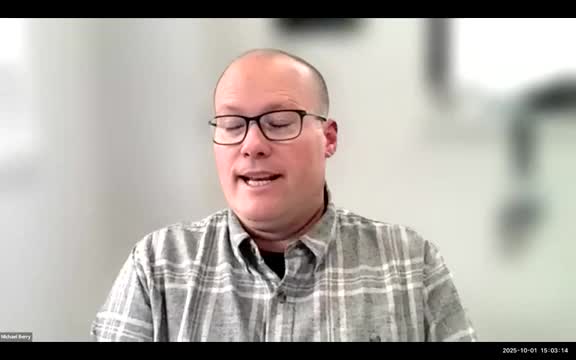9‑1‑1 enterprise board narrows first‑year priorities, asks for detailed grant proposals
Get AI-powered insights, summaries, and transcripts
Subscribe
Summary
At its Oct. 1 meeting the 9‑1‑1 Services Enterprise Board prioritized a statewide resource center, GIS support, language access and local authority grants and agreed to ask applicants for more detailed proposals; the board deferred formal adoption of a draft fiscal policy and directed staff to return it in November.
The 9‑1‑1 Services Enterprise Board on Oct. 1 prioritized a statewide 9‑1‑1 resource center, statewide and local GIS support, language-accessibility/transcription services and local authority grants as top uses for its first‑year funds and asked prospective applicants for more detailed submissions before making final grant awards.
Board chair Michael called the meeting to order and led discussion across project prioritization and a draft fiscal policy. Members discussed a short list of themes the board previously identified — the 9‑1‑1 resource center, GIS support, language accessibility and local authority grants — and debated how to allocate limited funds across statewide and local projects.
The board said it would flag dollar amounts against the four priority ‘‘buckets’’ and then ask requesters to submit more robust proposals so the board can compare and evaluate requests on a consistent basis. “We came up with something,” Michael said while describing the draft policy and the need for a submission template; he later summarized the near‑term plan: “Sage will bring the fiscal policy back to the agenda for next month.”
Why it matters: the board is developing how it will spend enterprise surcharge revenue and set funding and eligibility rules for local public-safety answering points (PSAPs) and other 9‑1‑1 stakeholders across the state. Members emphasized a mix of statewide investments (training, a resource center and cybersecurity/public education) and targeted local grants to address gaps not covered by the statewide work.
Key discussion points and supporting details
- Priorities named: Board members repeatedly elevated the 9‑1‑1 resource center and GIS work as top priorities, with statewide training, public‑education/cybersecurity outreach, language access/transcription and local authority grants also discussed. Members recommended grouping requests into statewide vs. local buckets.
- GIS sequencing and funding limits: Several board members said the statewide resource center’s GIS contract may cover much of the statewide need but will not close every local gap. Daryl said the state procurement process is still under way and that the GIS contract is “theoretically very close to an announcement.” One board member warned that “I don't think there's gonna be a lot of money left over within their half million dollar grant” for additional local GIS work, signaling that local requests may need supplemental funding to complete projects.
- Language access and transcription: Members debated whether to fund language translation and transcription centrally or leave choices to local authorities. Amy noted Everbridge — a vendor used by some PSAPs — has announced a language translation module scheduled for “Q1 or Q2 of next year,” which could affect demand for enterprise funding for that capability.
- Proposal requirements and application form: The board reviewed a draft fiscal policy (article 5) listing proposal elements such as an executive summary, problem statement, project description and budget. Members asked staff to produce a simple submission template (an executive summary, project description and budget) that reduces burden on applicants while providing enough information for the board to compare requests. Board members also discussed using the Caring for Denver Foundation’s grant template as a model.
- Eligibility, supplanting and terms: Board members agreed to require applicants to state intent that enterprise funds will not supplant existing funding; a written certification will be required in proposal materials. The board also agreed terms and conditions (including timing and funding method and return of unused funds) should be decided case by case and reflected in individual funding agreements.
- Transparency and public records: Members discussed state reporting obligations and public disclosure. Michael and Daryl referenced statutory reporting duties to the legislature and the Public Utilities Commission; the board asked staff to include language in the policy noting that certain documents may be subject to disclosure under state law (for example, CORA/OML obligations) and that the enterprise will post required reports on its website.
Decisions, directions and next steps
- The board did not adopt the draft fiscal policy at the Oct. 1 meeting. Instead the board directed staff to produce a pared‑down application template and return the fiscal policy to the Nov. 5 meeting for further consideration. “Sage will bring the fiscal policy back to the agenda for next month,” Michael said.
- Staff were directed to: (1) prepare a concise application template (executive summary, problem statement/project description and budget), (2) develop a clear submission timeline and (3) include certification language regarding non‑supplanting and terms for return of unused funds in funding agreements.
Meeting logistics and participation
- The board approved the Sept. 3 meeting minutes by voice vote (motion moved by Matt; seconded by Lynn), and later adjourned on a motion by Lynn and second by Andrew.
- The board set a follow‑up meeting for Wednesday, Nov. 5 at 3 p.m. and asked staff to return a revised fiscal policy and submission form at that time.
Ending
Board members emphasized that this is a first‑year process and that more detailed proposals will be required before the enterprise makes awards. The board plans to use the next month to develop the application template, clarify reporting and public‑records guidance and return the draft fiscal policy to the full board at its Nov. 5 meeting.
